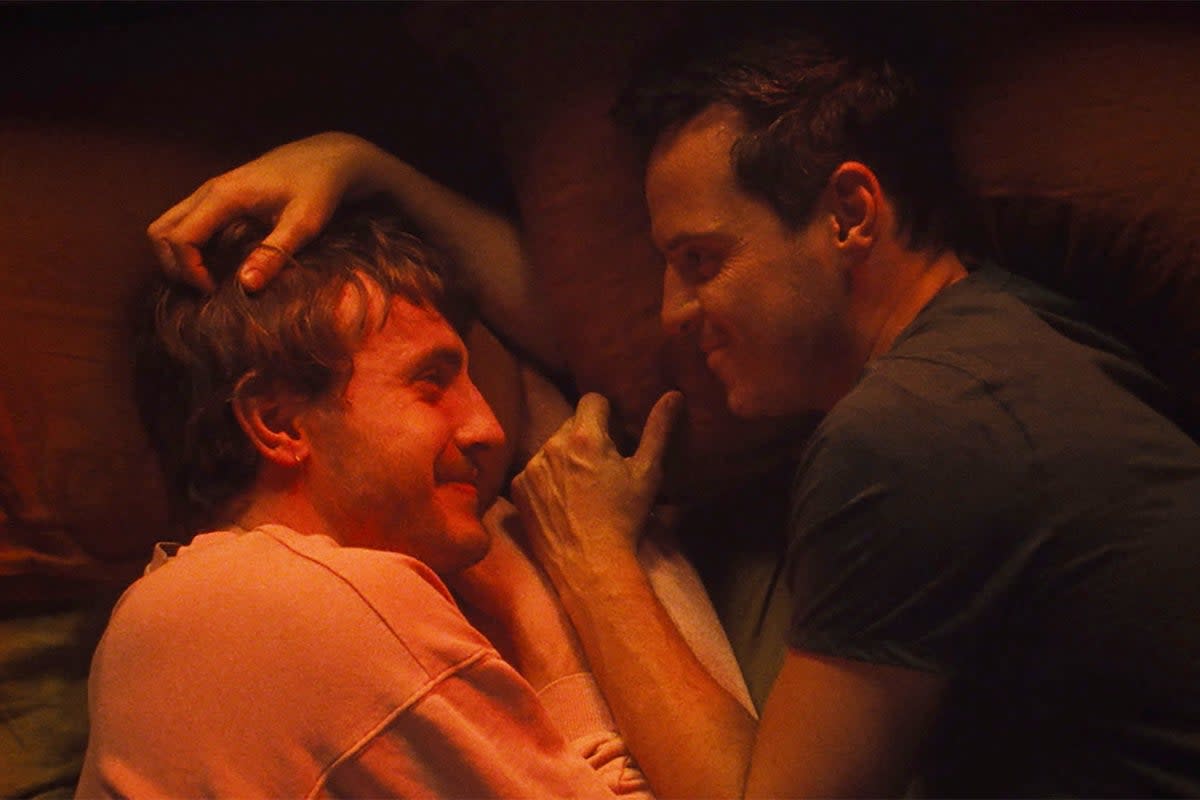All of Us Strangers review: Andrew Scott gives the performance of his career in this tender ghost story

A thunderous ache stretches across Andrew Scott’s features in All of Us Strangers. His eyes are softly lidded, his lips twisted. In Andrew Haigh’s melancholy ghost story, where real ghosts are out-haunted by words left unsaid, Scott, an actor of fierce intelligence, channels shrewdness into tragedy for the greatest performance of his career.
He plays Adam, a frustrated screenwriter living in a new-build block of flats in south London. It appears he’s the only person alive there, traversing these shadowy, dimly lit corridors – that is, until Harry (Paul Mescal) turns up to this door, drunk and clearly hungry for his attention. Adam is withdrawn, too settled in his solitude to reciprocate, yet their meeting has a strange, seductive quality to it.
In fact, All of Us Strangers exists entirely in this lucid, twilight state, where both sunlight and starlight must battle to pierce the veil of Adam’s loneliness. It creates a necessary logic for Haigh, whose past work, including relationship dramas Weekend and 45 Years, is typically intimate and frank, but never so dreamlike. His film, which adapts the late Japanese novelist Taichi Yamada’s 1987 novel Strangers, flows seamlessly into its next incident: Adam travels back to his childhood home, just outside Croydon, in an effort to break his writer’s block (we see him, earlier, typing out “EXT SUBURBAN HOUSE 1987” on a blank page).
His mother (Claire Foy) and father (Jamie Bell) greet him. They look younger than Adam, and the neatly trimmed moustache and crested wave of permed hair dates them immediately. Adam’s parents died in a car crash when he was 12, and yet somehow, by magic or delusion, he’s been granted the opportunity to talk with them again. In the family room, the radio plays The Ink Spots’ “I Don’t Want to Set the World on Fire” and Frankie Goes to Hollywood’s “The Power of Love”.
The conversations they have are simple but painfully familiar, peppered with the kinds of confessions any orphan or neglected child would kill the world to hear. It’s an uncomfortable, but pressing desire: would your parents show regret if they were confronted with the ways they harmed you? Adam comes out to his parents, and gets to imagine what the interaction would have been like. His mother – Foy shrewdly deploys an empathetic but misplaced fussiness – doesn’t spurn him, but betrays too many concerns about her boy’s future. He tells her about the progress she’ll never witness, and insists: “everything is different now”. But there’s a hesitation in his eyes. His father’s response is more self-reflective, quietly issued by Bell in an understated, affecting performance.
With each visit, Adam clings a little harder to his memories, ending up in his old pyjamas, curled up in his parents’ bed. It’s as if he’s trying to go back and start anew, and shed himself of all the fear and insecurities that brought him to his London flat, alone and uncomfortable in his own body. All of Us Strangers is very much the story of Haigh’s generation – so specifically, in fact, that the writer-director shot scenes in his own childhood home – and what it means for the gay men who have seen a better world but don’t necessarily feel freed by it. At one point, Adam and Harry have an enlightening conversation about the use of the word “queer” as a descriptor.
But Harry, the representative millennial, has a confidence that conceals his own alienation, and Mescal adds him to his impressive gallery of gentle, suffering men. The passion these two men share is tenderly captured, yet it’s hard not to spend All of Us Strangers in quiet fear these lovers will not prove to be each other’s salvation. We are all born ghosts, yearning to live.
Dir: Andrew Haigh. Starring: Andrew Scott, Paul Mescal, Jamie Bell, Claire Foy. 15, 106 minutes.
‘All of Us Strangers’ is in cinemas from 26 January


